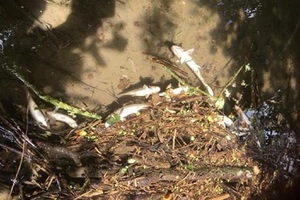Farming company fined for polluting Somerset watercourse
Farming company Velcourt Ltd, who manage and advise on farms throughout Europe, polluted a Somerset watercourse with dirty, ammonia-rich water, killing hundreds of fish.

Some of dead fish discovered in the Hardington Brook, a tributary of the River Frome
Magistrates have ordered the company to pay £34,000 in the case brought by the Environment Agency.
Velcourt pleaded guilty at North Somerset Magistrates Court on Monday 4 April 2022, to polluting a tributary of the Hardington Brook, Hardington, Somerset, on or before 1 August 2018.
The company, whose head office is in Ross-on-Wye, was ordered to pay the Environment Agency costs of £14,000, a total fine of £20,000 and a victim surcharge of £170.
On 1 August 2018, the Environment Agency received reports of dead fish in the Hardington Brook and Buckland Brook – tributaries of the River Frome. Officers attended and found dead fish – including brown trout and bullhead in the Hardington Brook.
The next day they traced the discoloured water to a side stream flowing from the direction of Manor Farm, where they found a non-permitted discharge from the farm’s surface water drainage system.
The discharge was heavily discoloured, and samples confirmed it would prove fatal to fish because of its concentration of ammonia and very high biological oxygen demand which limited the oxygen supply to the fish in Hardington Brook.
Manor Farm is owned by the Radstock Cooperative Society, but operated on their behalf by Velcourt Ltd, of Orchard House, Phocle Green Business Park, Ross-on-Wye.
The farm manager stopped the discharge and emptied the ditch. But a follow up inspection by an Environment Officer on 14 September 2018 found polluting matter in the ditch.
The inspection concluded the farm’s dirty drainage system still posed a ‘high potential pollution risk’ due to insufficient storage capacity and appropriate engineering. Consequently, farm run-off was able to enter the surface water ditch and subsequently the watercourse.
The Environment Officer concluded the farm infrastructure was not adequately constructed in accordance with the Water Resources (Control of Pollution) (Silage, Slurry and Agricultural Fuel Oil) (England) Regulations 2010 (SSAFO Regulations). Clean and dirty water systems were not adequately separated, and the slurry storage and dirty water drainage systems had not kept pace with the expansion of activities at Manor Farm.
Jo Masters for the Environment Agency said:
We expect much better from such a large and experienced farming business, both for the environment and the local community.
Regulations are in place to protect the environment and our communities and by not keeping up with the regulations this company has put the environment at risk of harm.
Since the incident there has been considerable investment in the farm’s infrastructure and Velcourt has also reviewed arrangements at the other farms it manages.
Charge:
On or before 1 August 2018, at Manor Farm, Hardington, Velcourt Ltd caused a water discharge activity not under or to the extent authorised by an environmental permit, namely the discharge of poisonous noxious or polluting matter into a tributary of the Hardington Brook, Somerset.
Notes to editors
Radstock Cooperative Society
In 2020 the Environment Agency accepted an Enforcement Undertaking (EU) from Radstock Cooperative Society in relation to their responsibilities in this case.
The Society, which owns Manor Farm, has made a payment of £10,000 to the environmental charity Westcountry River Trust.
What is an Enforcement Undertaking?
An Enforcement Undertaking is a Civil Sanction available to the Environment Agency (EA) as an alternative sanction to prosecution or monetary penalty for dealing with certain environmental offences. It is a legally binding voluntary agreement proposed by a business (or an individual) when the EA has reasonable grounds to suspect that an environmental offence has occurred.
Enforcement Undertakings for environmental offences were introduced under the Environmental Civil Sanctions (England) Order 2010 and the Environmental Civil Sanctions (Miscellaneous Amendments) (England) Regulations 2010.
Accepting an Enforcement Undertaking is always at the discretion of the EA but if accepted enables firms and individuals who have damaged the environment or operated outside of legislative requirements to offer to complete actions which will address the cause and effect of their offending, including making a payment to a suitable environmental project.
EUs can be offered for offences including polluting rivers, breaching permit conditions designed to protect communities, or not registering and follow recycling/recovery obligations. The Environment Agency then carefully considers whether the actions offered by the offender are acceptable.
Why use Enforcement Undertakings?
-
Businesses will voluntarily secure compliance now and in the future, without attracting a criminal record
-
The environment, local community and those directly affected by the offending can benefit through actions being offered in an EU
-
They allow the EA to deal with the less intentional and polluting offending in a more proportionate way than prosecution through the criminal courts
The Environment Agency reserves the right to prosecute, where offenders do not follow the terms of an Enforcement Undertaking offer.